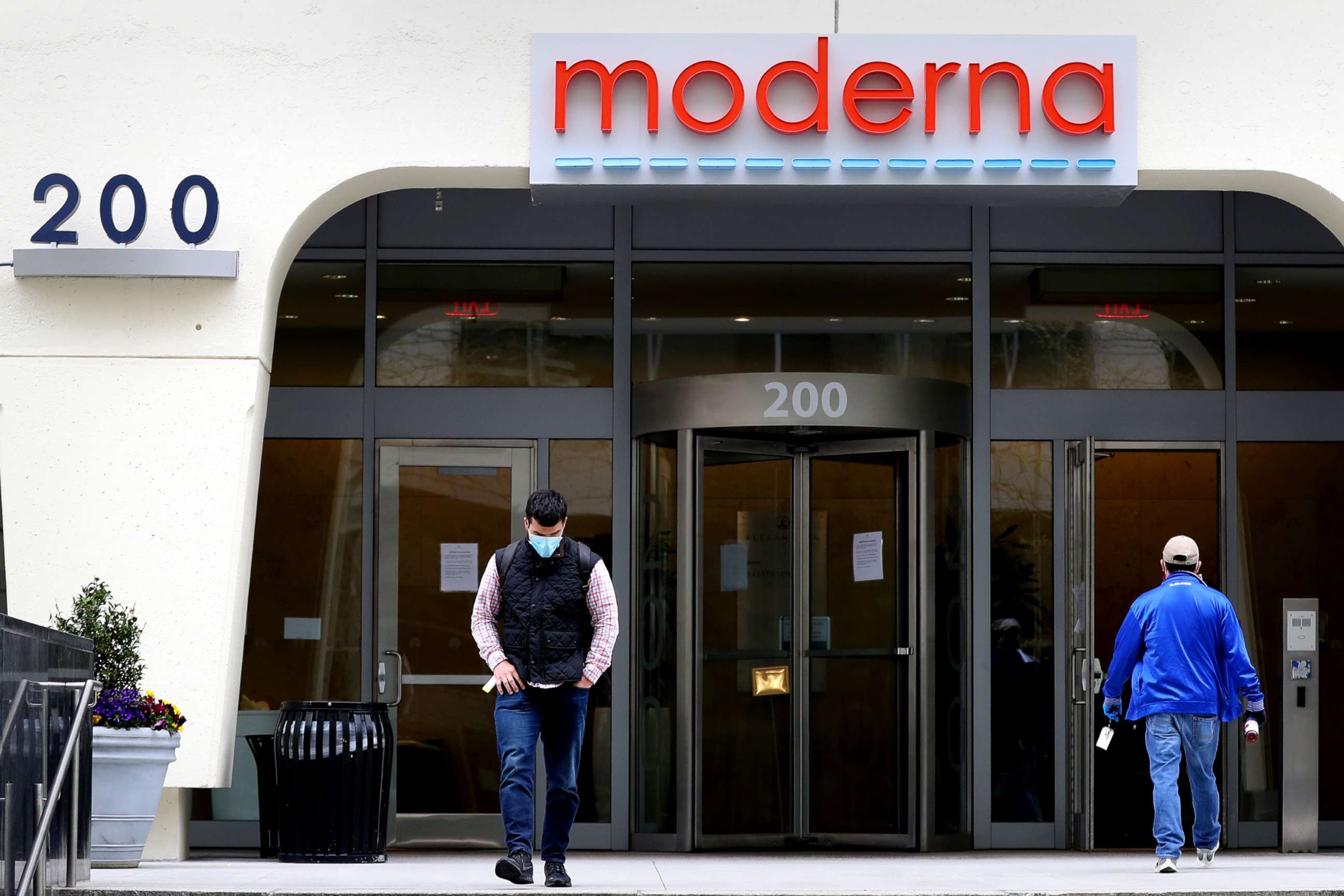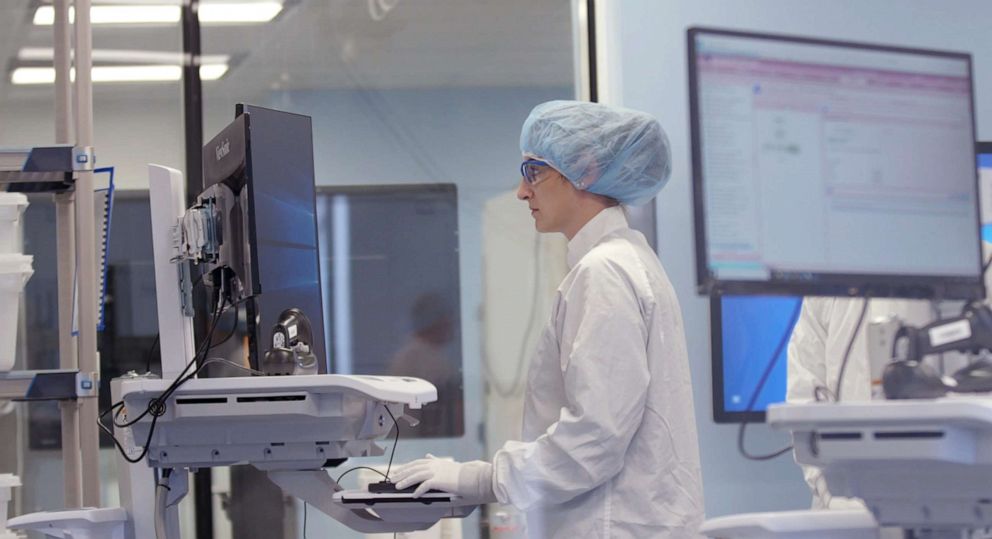‘Science by press release’: Sudden rise of vaccine developer Moderna rankles some in scientific establishment
Favorable early results have generated excitement and brought scrutiny.
Moderna Inc., a nearly 10-year-old Massachusetts-based biotech company, is suddenly the talk of the scientific community after they announced this week "positive" indications from their early work on a potential vaccine against the novel coronavirus.
Not all of it is complimentary.
The company has been embraced by a Trump administration desperate for good news in the fight against COVID-19. In April, Moderna received $483 million from the Biomedical Advanced Research and Development Authority (BARDA), the government agency charged with overseeing the rapid production of a vaccine. And last week, one of its board members, Moncef Slaoui, was appointed the nation's new "vaccine czar," leading him to resign from his position at the company and announce plans to divest more than $12 million of equity holdings amid concerns about potential conflicts of interest.
But while the announcement of favorable preliminary results has generated widespread excitement and put the company at the forefront of the race for the most sought-after vaccine in more than a century, some in the typically staid and sober scientific establishment have begun to question the company's decision to publicize preliminary results by press release with no supporting data.
"It's a bunch of opinions in a press release with no data," Dr. Peter Jay Hotez, Dean of the National School of Tropical Medicine and Professor of Pediatrics and Molecular Virology & Microbiology at Baylor College of Medicine, told ABC News. "You don't do science by press release."
This type of behavior can have a "damaging effect," Hotez said, by offering false hope that a vaccine could be ready in weeks or months, when the actual timeline is likely significantly longer.

Dr. Andrew Pavia, Chief of the Division of Pediatric Infectious Disease at the University of Utah, echoed these concerns.
"Good science requires that we can see the methods and the details of the results," Dr. Pavia told ABC News. "It is a product of the pressures of the pandemic, but it leaves many questions unanswered."
In response to questions from ABC News, Moderna's Chief Executive Officer Stéphane Bancel issued a brief statement.
"The totality of data from our vaccines platform gives us reason to be optimistic about the prospects for our vaccines to come, including our vaccine against the novel coronavirus," Bancel said.
After announcing a vaccine candidate in January, Moderna reported on Monday that its potential vaccine "elicited neutralizing antibodies in all eight" of the participants for which data was available so far from its Phase 1 trial. The vaccine was also "generally safe and well tolerated," the release said, meaning there were no serious side effects observed.
Stéphane Bancel, Chief Executive Officer at Moderna, said the company "could not be happier about this interim data," and its stock soared following the news – from $66.69 per share at close on Friday to $86.28 following the announcement – leading at least one expert to question the motives behind the release.
"They are not speaking to the American public," Hotez told ABC News. "They are speaking to their investors and their shareholders, and that's the way they do business."

The press release may have been lacking in important details, but it's not unusual for companies to publish a brief summary of results, called "topline data," prior to disclosing more complete data and analysis in peer-reviewed journals.
On Wednesday, Bancel defended the move in an interview on Fox Business, claiming the company did not put out the full data in order to "preserve the ability very soon for [National Institute of Allergy and Infectious Diseases] to be able to publish that data in a peer-reviewed medical journal."
Dr. Robert Hopkins Jr. a professor of internal medicine at the University of Arkansas for Medical Sciences and the chair of the Department of Health & Human Services' (HHS) National Vaccine Advisory Committee, said he is "skeptical" of any study that has not been peer reviewed but told ABC News he remains "cautiously optimistic."
"If this is true, and it stands up to peer review that's wonderful and I'm hopeful," Dr. Hopkins said, "But we just have to keep our fingers crossed until we can look at it."

Moderna is one of eight groups that have begun testing its vaccine candidate in humans, according to the WHO, and it was the first to do so in the United States. The company is currently working on over 20 different vaccines and therapeutics for a range of diseases including cancer, hepatitis and Zika, according to its website. Three have made it to Phase 2 trials. But the company has not yet brought a vaccine or therapeutic to market.
Vaccine development is typically a lengthy and complex process. According to a study in the The National Center for Biotechnology Information, the entire process from "from concept to licensure" currently takes at least 15 years. Global deployment, the study said, "extends in most cases beyond 20 years."
Moderna, however, has said if their vaccine, which is being fast tracked by the Food and Drug Administration, proves safe and effective and is ultimately approved by the FDA, it could be available to the public by early 2021.
Much of the excitement surrounding the company stems from its use of messenger RNA, or mRNA. Unlike a traditional vaccine, which injects a safe version of the virus to trigger an immune response, mRNA vaccines instead use snippets of genetic code to instruct the body to produce viral proteins, thereby triggering an immune response. Its proponents say it could produce a vaccine that generates a more potent antibody response.
Dr. Drew Weissman, a professor of medicine at the University of Pennsylvania who developed the technique and licensed it to Moderna, hailed the announcement as "fantastic" before cautioning that the vaccine still has a long way to go.
"Nothing is guaranteed," Dr. Weissman told ABC News. "There are still many stages that need to be achieved."

Dr. Barton Haynes, the Director of Duke University's Human Vaccine Institute, echoed Weissman's confidence in the new method. He called mRNAa "promising technology" that should be able to produce vaccines that are more cost effective and quicker to develop.
"There is lots of literature for using this technology," Dr. Haynes said. "It should be much easier to make vaccines as mRNA."
Tune into ABC at 1 p.m. ET and ABC News Live at 4 p.m. ET every weekday for special coverage of the novel coronavirus with the full ABC News team, including the latest news, context and analysis.
Dr. Anthony Fauci, the longtime director of the National Institute of Allergy and Infectious Diseases, also expressed excitement about the technology. In a recent interview with National Geographic, Fauci said Moderna's mRNA vaccine was "quite impressive."
"These vaccines are inducing, at least in animal models, really rather substantial immune responses, particularly the mRNA vaccine," Fauci said. "When we look at the immune response that you can induce with a modest dose – one that's feasible to be translated into humans – and the amount of time it takes to get to that level of immunity, it is really quite impressive."
But experts still say diversity will be key moving forward in the vaccine space. Should one vaccine fail to deliver, it is critical to have numerous other options also in the pipeline.
"I certainly would not want to rely on the Moderna vaccine alone," Dr. Hotez said. "It's critical that we realize this is a company that has never materialized a vaccine before."
What to know about coronavirus:
- How it started and how to protect yourself: coronavirus explained
- What to do if you have symptoms: coronavirus symptoms
- Tracking the spread in the US and Worldwide: coronavirus map




